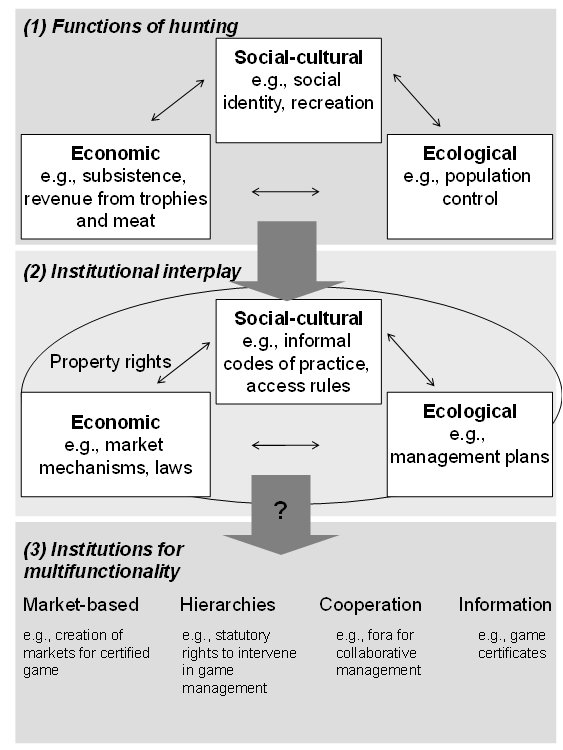How can the multifunctionality of hunting be governed in a sustainable way?
On the multifunctionality of hunting – an institutional analysis of eight cases from Europe and Africa
Background
In many contemporary societies, multiple functions are connected to hunting. Here, we use the concept of multifunctionality to analyse the interactions between these functions, and the interplay between the institutions governing these.
Through a comparative analysis in eight study sites in Europe and Africa our study provides insights into the tensions emerging from the multifunctionality of hunting, organised in three steps (Figure 1):
1. Identifying functions of hunting, i.e. provision of goods and services, in relation to three categories: ecological, economic and socio-cultural functions
2. Analysing institutional arrangements (both formal and informal) related to each of these functions, and their interplay
3. Identifying in what way conflicts and tensions between institutions have been addressed by the creation or emergence of institutional arrangements that reconcile or mediate between conflicting institutions and interests focusing on
(i) market-based governance mechanisms
(ii) hierarchical mechanisms, i.e., regulations or ‘command-and-control’ mechanisms
(iii) cooperation, i.e., collaborative arrangements, and
(iv) information, such as certification that enables the consumer to make informed choices.
Based on our conceptual framework (Fig. 1) we investigated differences and similarities between study cases (three in northern Europe (Norway, Sweden and Scotland), one in southern Europe (Spain), two in eastern Europe (Croatia and Slovenia) and two in Africa (Ethiopia and Tanzania)) to assess the complex patterns of institutional interplay.
The research process included a scoping phase, an in-depth document analysis, interviews and group discussions, and our conceptual framework was developed and refined throughout the entire process.

Figure 1
Key findings
We found that, increasingly, complex institutional arrangements have developed to reconcile tensions between the multiple functions of hunting that manifest themselves as perceptions of over-hunting (or over-management) or under-hunting. These include, for example, committees, area designations for multifunctionality, and certification schemes (see figure 1). However, these have, so far, not necessarily succeeded in addressing multifunctionality.
We suggest that the following aspects should be better recognised:
- Social functions of hunting for local people need to be given more attention
- Where institutional systems have developed in parallel – and seem to be neither vertically nor horizontally integrated – they should be actively reconciled
- A move from a single-species to an ecosystem approach would contribute to an institutionalisation of the multifunctionality of hunting, game management and other activities, and help to create institutional synergies at the horizontal level, addressing issues of under-hunting, and possibly also over-management
- The problem of over-hunting might more appropriately be addressed by (a) a better recognition of the functions of hunting for local people and (b) an improved implementation and enforcement of existing arrangements, such as Wildlife Management Areas.
Read more in:
Fischer, A., Sandström, C., Delibes-Mateos, M., Arroyo, B., Tadie, D., Randall, D. Hailu, F., Lowassa, A., Msuha, M., Kereži, V., Reljić, S., Linnell, J., Majić, A. (in press): On the multifunctionality of hunting – an institutional analysis of eight cases from Europe and Africa. Journal of Environmental Planning and Management.
Abstract:
In many contemporary societies, multiple functions are connected to hunting. Here, we use the concept of multifunctionality to investigate the role of hunting beyond its traditional function of supplying meat. Hunting may contribute, for example, to biodiversity conservation, recreation and the preservation of economies and cultures of rural areas. Our comparative analysis of hunting in eight study sites in Europe and Africa examines the tensions and trade-offs between these ecological, economic and social functions of hunting, and investigates the interplay between the institutions regulating these functions to better understand conflicts over hunting. Based on this analysis, we present institutional arrangements that have developed to address these challenges of multifunctionality, and explore the institutional change brought about by such arrangements. Finally, we discuss implications of this study for policy and institutional design.